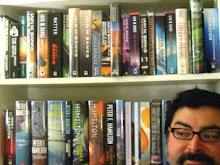Howdy.
So the Press now Twitters...and shudders & convulses. Visit
@3rdplacepress for witty 140 character-or-less asides. Feel free to heckle.
This remarkable journalist, after pain-staking research and interviews, was rejected by various magazines, and in frustration took matters into her own hands. What I find fascinating is that in this era of the 'death' of newspapers, and preceding it, the 'death' of real journalism, here's a solution that benefits
not Newspapers or the corporations that run them, but the reason why News matters: the
journalist.
Freelancing is tough, and in this case the writer put a lot of her own money into the article, for potentially no return at all. So there is a wealth of writing that sits in the hard drives & desk drawers of journalists that the world can't read because some Magazine or Newspaper didn't think it had a broad enough appeal. But in this global age, there's
no such thing as a piece of journalism that doesn't have an audience receptive to it. I salute this writer and hope that she makes all her money back and inspires a legion of journalists... or wait, would the grouping be a
bullpen of journalists? Just like the grouping a
conspiracy of booksellers...
Over at
Galleycat they have a poll going for the publishing insider with the most accurate view for how publishing will change over the next 10 years.
It's fascinating. And I don't agree with some of the predictions, but there are some astute views:
"Most authors will be indie authors" (Mark Coker)
"...book publishing will (finally) be transformed from a business that chops down trees and puts returnable books into bookstores... into one that finds ideas, funds the writers that need it, and uses their (authors' and publishers') leverage and skills to promote those ideas to people willing to pay for them, in whatever format is the most efficient way to get that transaction to occur." (Seth Godin)
" Amazon, now a de facto publisher, would throw off the cloak and come out as a full competitor with traditional publishers." (Richard Curtis)
" Territory will become a bone of contention as e-readers and e-book smart phone apps become available more widely." (Jane Dystel)
"A new breed of author rises, buoyed on a cult of Internet celebrity, fueled by their ability to quickly churn out opinionated/compelling content on a consistent basis, stay in constant communication with fans, deliver custom pieces directly targeted to audience requests, and generate works consumable in brief bursts that fit better with readers' increasingly hectic lifestyles... I suspect we'll eventually see the rise of ultra-prolific penmen that take advantage of electronic publishing (the main costs being associated with researching, writing, laying out and possibly digitally delivering books - not dealing with physical goods, storage, distribution, ongoing overhead, sales staff, etc.) to - regardless of actual writing experience or talent - powerhouse players in the industry." (Scott Steinberg)
And I Link to the whole of Richard Nash's piece, because it just
kicks ass.
I take issue with Jane Dystel's predictions, mostly because they are too Agent-centric. She's ok with divisions at publishing houses shrink, jettisoning editors, lines, consolidating--all things that have put the industry in this mess.
Less quality control from the editorial staff and more from the marketing departments. " Outrageous advances for "big" names will get even larger while those for others will continue to decrease"-- what she's describing there is the Publishing Industry
careening drunk off a cliff, and while it may be a prediction it
shouldn't happen. Huge advances need to come down in order to save the industry.
From Scott Steinberg we have this gem: "Today's books are
basically passive, one-way transfers of information in which the reader willingly digests an author's words and views with no expectation of having a say within the context of the given dialogue."-- which is essentially the most Corporate-Speak souless thing anybody has ever said about the intrinsic nature of the book. I'm less likely to pay attention to his other predictions for the book, since I don't feel he respects it.
Richard Curtis says ""1. First and foremost I predict that the size and price of Espresso print on demand will come down to the point where POD kiosks will be installed in non-bookstores like supermarkets, libraries, pharmacies and the like. Which means that...2. The grip of Barnes & Noble as the go-to bookseller will be loosened. You'll be able to buy a book at Publix, Duane Reade, or Starbucks. You'll have a selection of millions of titles, not just what can be packed into the shelves and tables of a brick and mortar bookstore."
It already exists with the mass market racks at such non-book places. But what Curtis doesn't figure is that people buying books at those places
don't want to browse, they don't want too many choices, so while the customer may have access to millions of titles, they'll only buy from the 10 books highlighted on the main screen. Bookstores exist for the
browsing experience, the happy accident, the ability to take 2 books (about blogging, say) and compare them.
Mark Coker: "95% of all reading will be on screens." This from an
ebook company owner. "There will be fewer bookstores, though books will be more plentiful than ever before." But will he be happy about it when indie bookstores merge ebook sales with the walk-in experience (
hurry up ABA)?
Ultimately, it's an interesting array of predictions and, whether they end up being right or wrong, worth your time to explore them.






